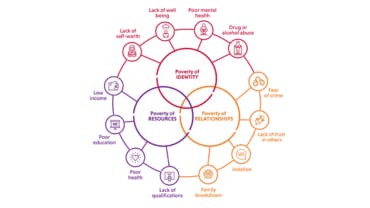"I have loved you" Pope Leo's Apostolic Exhortation, and what it might mean for all Christians
Date Posted: Oct 16, 2025.
On the feast day of St Francis of Assisi, Pope Leo XIV released his Apostolic Exhortation to all Christians. The Rev'd Adam Edwards, our Deputy CEO, reflects on the message and what it might mean for all Christians.
'Dilexi Te' focuses on our love for the poor. Work on the document was begun by Pope Francis in the final few months before his death, and has been completed by Pope Leo.
This, to me, feels a fitting first writing of this new pontificate. It carries on the legacy of Pope Francis’ love for the poor and his call for the Church to be poor and for the poor. It also follows some of the themes of the last Pope to take the name Leo, who, in 1891 wrote 'Rerum Novarum,' focused on the economic and social injustices arising from the industrial revolution. This was the foundation text that led to Catholic Social Teaching.
For Pope Leo, care and love for the poor is central to the life, worship and teaching of the Church. It is not a side-show for those interested in social action and social justice, but a fundamental part of the identity of the Church. Pope Leo takes us on a journey through the history of the Church from the Acts of the Apostles through the great theologians and monastic movements to show that social action and justice are not a modern phenomenon, but have been a thread running through the history of Christianity, and it is at the heart of the times of renewal and revival that the Church has seen.
Indeed, Pope Leo offers a prophetic vision for a new revival in the Church, and that our Christian response to the poor is one that the world desperately needs. Pope Leo calls on Christians not to see the poor as simply a societal problem, but a familial one where we are each called to look out for, and stand in solidarity with our brothers and sisters. But these are not merely our brothers and sisters, but people unconditionally loved by God and made in his image. As Christians we are called to a special solidarity with the poor because of our faith in Jesus who became poor and was always close to the poor and outcast – and that is the basis of our concern for our world’s most neglected members.
This theological and incarnational rootedness of our care for the poor is shown as Pope Leo surveys the Old and New Testaments, drawing examples of how this work is rooted not only in tradition but in scripture, and especially in the Gospels and the life of Jesus, and that poverty marked every aspect of Jesus’s life.
Pope Leo constantly reminds us that there is a Biblical preferential choice for the poor and that this is a source of renewal not only for the Church but for society.
He reflects that there is not just one definition or understanding of poverty and that it is a multifaceted phenomenon with many faces of the poor and poverty.
Here at CUF, we would describe this as the Web of Poverty, and you can find out more about this on our Knowledge Bank.
This is a refreshing and encouraging document to read as an Anglican Christian as we look forward to the tenure of a new Archbishop of Canterbury and what God might be asking of the Church in England in 2025. It reminds us that Christian love breaks down every barrier, brings close those who were distant. It reminds us that Christian love is prophetic: it works miracles and knows no limits. It makes what was apparently impossible, happen. For Pope Leo, and indeed for us, love is above all a way of looking at life and a way of living it.
For me, this work of love and care for the poor and vulnerable and speaking out about injustice is not an optional extra in a Mission Action Plan, but a central part of the life of the Church. This is not about ‘doing to’ the poor, but standing in solidarity with our brothers and sisters; because we can not only serve them, but learn from them. As Pope Leo puts it: “Christian holiness often flourishes in the most forgotten and wounded places of humanity – those places that have a special place in god’s heart”.
I will leave you with the final words of this document as a call for renewal: “Through your work, your efforts to change unjust social structures or your simple, heartfelt gesture of closeness and support, the poor will come to realize that Jesus’ words are addressed personally to each of them: “I have loved you” (Rev 3:9).”
The Rev'd Adam Edwards is CUF’s Deputy CEO.
Prior to this Adam was Chief Officer of Transforming Communities Together, a member of CUF’s Together Network. He has a deep passion for church involvement with social action projects and is a Self-Supporting Priest in the Diocese of Lichfield. Adam has a Master’s Degree in Theology and his dissertation focused on the links between the Eucharist and social action.


